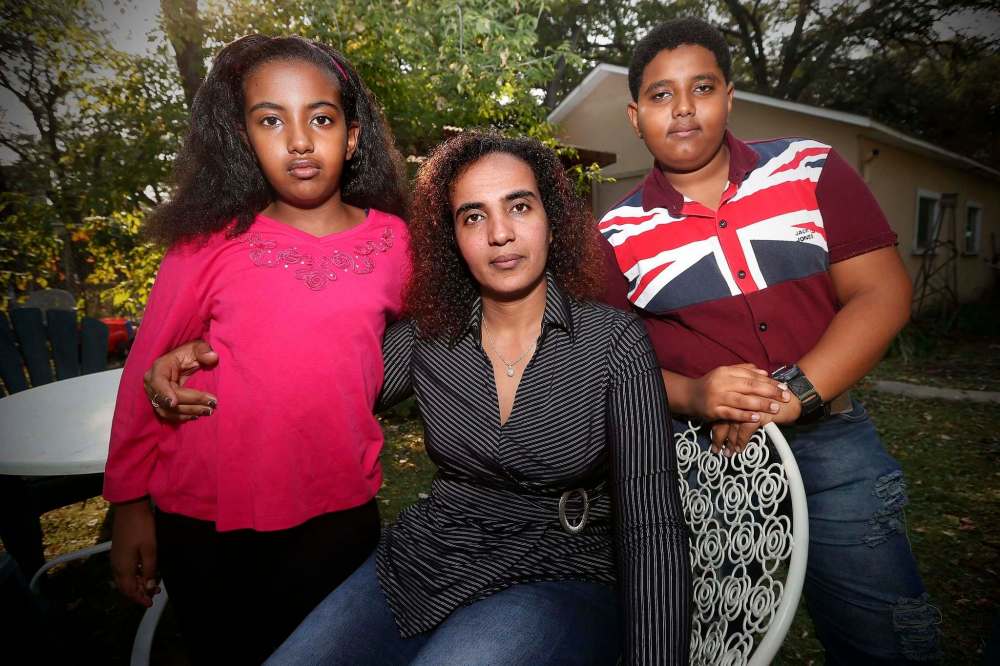Last-minute opening means refugee will learn English
Uncertain whether more class spots will be available
Advertisement
Read this article for free:
or
Already have an account? Log in here »
To continue reading, please subscribe:
Monthly Digital Subscription
$19 $0 for the first 4 weeks*
- Enjoy unlimited reading on winnipegfreepress.com
- Read the E-Edition, our digital replica newspaper
- Access News Break, our award-winning app
- Play interactive puzzles
*No charge for 4 weeks then billed as $19 every four weeks (new subscribers and qualified returning subscribers only). Cancel anytime.
Read unlimited articles for free today:
or
Already have an account? Log in here »
Hey there, time traveller!
This article was published 20/09/2017 (2401 days ago), so information in it may no longer be current.
After learning her spot in an English-language class was one of many cancelled last week due to a lack of federal funding, Saba Temnewo caught a break. Some students who had been accepted found jobs and dropped out, opening up a space for her.
More newcomers waiting to attend Enhanced English Skills for Employment may soon also catch a break, the executive director of the Winnipeg program said.
“We have had the province (through the Manitoba provincial nominee program) reach out to us to get more info, so perhaps there will be further support coming in the future,” Louise Giesbrecht said this week.

A spokeswoman for the provincial government wouldn’t say for sure.
“The Manitoba government has committed to reinvest the revenues generated by the Manitoba provincial nominee program into programs and services that support the successful integration of newcomers to this province and their families,” the spokeswoman said in an email.
While Manitoba is co-ordinating efforts for settlement services with Immigration, Refugees and Citizenship Canada (IRCC), it’s the federal government that’s ultimately responsible for administering funding for settlement services in Manitoba and “to ensure that the service needs of newcomers are being adequately met,” she said.
Temnewo, who started class on Monday, feels she is on her way to providing a good future for her children by improving her job prospects.
“It’s really great,” she said on Tuesday about the class, which helps newcomers with their English-language skills and Canadian cultural knowledge.
“Within two days, I can say I learned a lot.”
The high school graduate from Eritrea, in northeast Africa, said she already feels more confident after learning some basic Canadian workplace customs.
“I learned how to introduce myself,” said the mom, who arrived in Canada in July with her two children, ages 10 and 13.
“It’s going really well and I hope for the future to improve,” she said.
Temnewo, a refugee, attends language class in the morning and a safe food-handling course at the Immigrant Centre in the afternoon. Her goal is to work toward becoming a nurse.
Last week, the Free Press reported she was one of dozens of students who found out on Sept. 11 that federal funding for their Enhanced English Skills for Employment class didn’t come through and their registration was cancelled.
In the spring, IRCC signalled it was shifting its focus to very basic English as an additional language class for those at a Canadian Language Benchmark (CLB) between levels 1 and 4, from more advanced classes for those trying to achieve a CLB between levels 5 and 8.
Temnewo needs a CLB level 7 or 8 to qualify for training funds to become a health-care aide — the first step in her goal of becoming a nurse.
After having her hopes dashed, she got some good news Friday from the Enhanced English program.
“Saba was next on the waiting list and a number of people had cancelled their registration because they found employment, so we were able to invite her to attend,” Giesbrecht said.
“We are happy that it is good news for a few people.
“However, we still have classes that are empty because we can’t run the additional classes we had hoped to. It’s such a shame when you consider we are paying for the space whether it is empty or full.”
The federal government said it’s not accurate to say it is cutting funding for advanced English classes — IRCC is always adjusting programming for settlement, including language training, “to ensure that we are able assist the most vulnerable,” spokeswoman Faith St. John said.
“In some cases, need is greater at lower language levels versus higher and vice versa,” she said in an email. IRCC negotiates contribution agreements with service providers “with a view to ensuring that funding achieves best value for taxpayer dollars.”
“The department continues to work closely with service provider organizations in Winnipeg to ensure that the needs of newcomers to Canada are being met,” St. John said.
“Language training is fundamentally important and key to successful integration in Canada.”
carol.sanders@freepress.mb.ca

Carol Sanders
Legislature reporter
After 20 years of reporting on the growing diversity of people calling Manitoba home, Carol moved to the legislature bureau in early 2020.
History
Updated on Thursday, September 21, 2017 7:52 AM CDT: Adds photo


